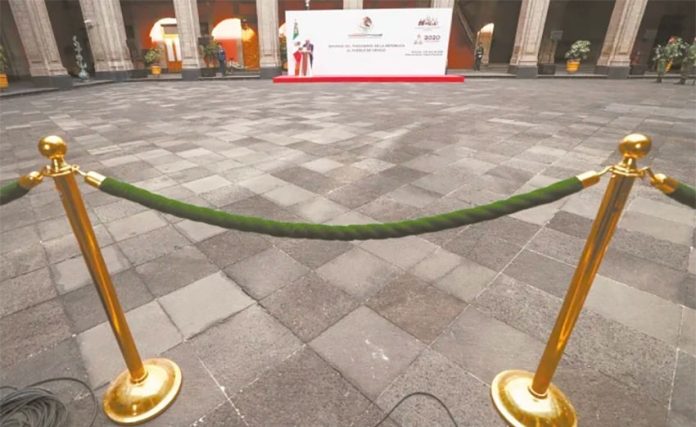President López Obrador said Sunday that the federal government will increase public investment and social spending, create 2 million jobs, provide loans to small businesses and individuals and adopt additional austerity measures in response to the coronavirus-induced economic crisis.
In a televised address from the near empty patio of the National Palace in Mexico City, López Obrador stressed that his administration will not bail out large companies, cut their taxes or increase public debt to support the economy as Mexico braces for a recession seen as inevitable due to the Covid-19 pandemic and the measures implemented to contain the spread of the disease.
Instead, it will strengthen actions in support of the poorest and most vulnerable, he said.
“In the face of recurrent crises, [past] leaders said that we had to take out more loans, bail out large companies and banks, convert the private debt of a few into public debt, establish tax privileges, put the prices of fuel and public services up, reduce salaries, dismiss workers and cut social security. Now this is not going to be done, it’s not the way. … The wellbeing of the people comes first. … Privileges, corruption, looting [of public coffers] and impunity – never again,” he said.
“The [economic] plan does not conform to the neoliberal model. Nothing will make us go back to the past,” the president declared.
López Obrador stressed that all of the government’s major infrastructure projects, including the Santa Lucía airport and the Maya Train, will continue, adding that his administration will invest an additional 25 billion pesos this year (US $1 billion) on water and drainage projects and to pave roads.
He also said that the government will build 50,000 new homes in marginalized areas, creating 228,000 jobs, and that the Federal Electricity Commission will build thermal power stations on the Yucatán Peninsula.
Pemex, the heavily-indebted state oil company, will get a 65-billion-peso tax break, the president said, while a 339-billion-peso (US $13.6 billion) public/private program for investment in the energy sector will be announced next week.
The State Workers Social Security Institute will provide personal loans of between 20,000 and 56,000 pesos (US $800-$2,250) to 670,000 workers and two government housing funds will issue housing loans worth 177 billion pesos to more than 440,000 workers, López Obrador said.
Small businesses and people who work in the informal economy will also have access to loans, he said, without specifying how much money they will be able to borrow. All told, 2.1 million government loans will be on offer, Lopez Obrador said, pledging that the government will not abandon the nation’s neediest.
The president also said that 190,000 fishermen will receive direct financial assistance from the government and that parents’ associations will be allocated additional funding for the maintenance of 31,000 schools.
Although large business will not receive any tax concessions or other financial support to help them weather the coronavirus storm, the government will “promptly” return tax refunds they are owed, López Obrador said.
![]()
The president asserted that the government will create 2 million jobs over the next nine months, highlighting that 80,000 of them will come from construction of the Maya Train in the country’s southeast.
López Obrador also said that an additional 200,000 jobs will be made available via the government’s tree planting program and that the modernization of the railroad across the Isthmus of Tehuantepec will create more than 7,000 jobs.
Funding for the economic response to the coronavirus pandemic – officially called the Emerging Program for Well-being and Employment – will come from a government stabilization fund, a range of trusts and the state development bank, he said.
Despite the depreciation of the peso and the impact of the coronavirus pandemic on the global economy, “we are doing everything possible to maintain the commitment not to increase public debt,” he declared.
To save public money, López Obrador said that he and all government ministers will take pay cuts and that high-ranking officials won’t receive end-of-year bonuses. He added that the government will reduce its advertising and operational costs as well as spending on travel, and seek to make additional savings in its purchases.
The president said that no government employees will lose their jobs but he called on them to work more efficiently and with greater commitment and “spirit of service” while maintaining “complete honesty.”
He thanked banks that have given their customers the option of freezing their loan and interest repayments for six months and expressed gratitude to businesses that have followed the government’s order to cease non-essential activities while maintaining their workforces and continuing to pay employees their full salaries.
“They’re showing their humanism, their social dimension,” López Obrador said.
He also reiterated his message that the coronavirus crisis is a temporary one that the country will overcome soon.
“Despite the adversities the transformation of Mexico will not stop, our strengths are greater than our weaknesses. … This crisis is passing, transitory,” López Obrador said.
“Soon normality will return. We will overcome the coronavirus. We will reactivate the economy and Mexico will remain standing, showing the world its glory and greatness.”
Source: El Universal (sp), La Jornada (sp), El Economista (sp), El Financiero (sp)
